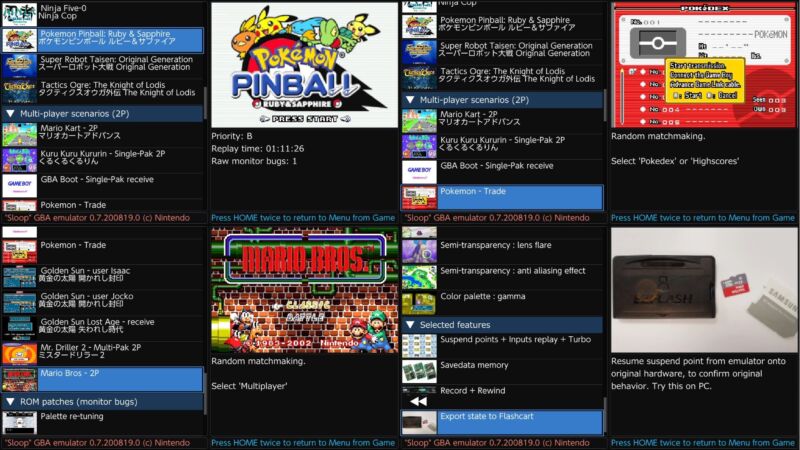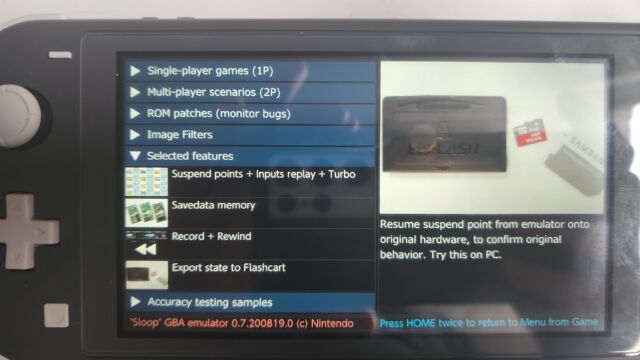 Enlarge / Are we looking at the official Game Boy Advance emulator made by Nintendo?
Enlarge / Are we looking at the official Game Boy Advance emulator made by Nintendo?
For the most part, the release of another classic console emulator for the Switch won’t be all that noteworthy. But experts told Ars that a pair of Game Boy and Game Boy Advance emulators for the Switch leaked online on Monday showed signs of becoming official Nintendo European Research and Development Division (NERD) products. This has some industry watchers hoping that Nintendo may offer official support for some emulated classic portable games in the future through the Nintendo Switch Online subscription service program.
What is the leak point?
The two leaked emulators — codenamed Hiroko for the Game Boy and Sloop for the Game Boy Advance — were first linked to the internet from a 4chan thread posted to Pokemon boards on Monday afternoon as fully compiled NSP files and encrypted NCA files. Later in the thread, the original publisher suggested that these emulators “are official in-house development versions of Game Boy Color/Advance emulators for Nintendo Switch Online, which have not been announced or released.”
Soon, data miners check the package Find a .git folder in the ROM. This folder contains commit logs that reference supposed development work circa August 2020 by NERD employees and, oddly, a developer at Panasonic Vietnam.
NERD’s history includes software development for the NES Classic and SNES Classic, as well as last year’s GameCube emulation. super mario all star, so the alleged involvement of the sector would not be unusual. The footage from the leaked Game Boy Advance emulator also includes “(c) Nintendo” and “(c) 2019-2020 Nintendo” at various points.
While suggestive, none of this is definitive evidence that Nintendo was involved in making these emulators. Some skepticism may also be warranted, as there is historical precedent for emulator developers trying to gain more traction by pretending their homebrews are “leaked” official Nintendo releases.
 Enlarge / Why does the official Nintendo emulator refer to a 3rd party flash car?
Enlarge / Why does the official Nintendo emulator refer to a 3rd party flash car?
Some observers also pointed to other reasons to suspect these leaks are “official” Nintendo work products. modern retro gamer and other According to the GUI, the leaked GBA emulator includes an “export state to Flashcart” option designed to “confirm the original behavior on original hardware”. The option is illustrated by a picture of an EZFlash third-party flash card in the emulator interface, an odd choice considering Nintendo’s previous lawsuits against manufacturers of such flash cards.
The “save data memory” option in the emulator also mentions “comparability with flash cards, other emulators, [and] Fan sites…” Here’s a list that would serve as a decent Johnny Carson “Carnac the Magnificent” setup for “something Nintendo doesn’t want to reference in an official product.”
“I absolutely believe in its legitimacy”
So, are these emulators from Nintendo or are they an elaborate hoax? Nintendo has not responded to a request for comment, so we consulted with a video game historian who has been actively involved in tracking, cataloguing and preserving Nintendo prototypes through various online communities over the years.While the source asked to remain anonymous to avoid any potential pushback from Nintendo, they said they were “99.9% sure” [the emulators are] true” and “I personally absolutely believe in its legitimacy. “
Our sources say the strongest evidence of Nintendo’s involvement with these emulators is the security signature on the NSP file. The signature ensures that the NSP will only run on development hardware “as the prototype is signed with a different key than the retail game,” our source said. Someone trying to install an emulator file on a hacked retail Switch “just encounters an error and won’t boot.”
In theory, a homebrew developer with access to the Switch development hardware could forge a signature file like this.But our source said, “It’s very difficult to fake an NSP signed by a developer. Only those with a good understanding of and access to the SDK know how to do it.” Doing so would also take “many, many hours. [spent] Learning how to use the broad SDK,” our source said. That intimate SDK knowledge “is not really the point at all for most people [homebrew] Developers on Switch,” they added, focusing on other tools for making software for hacked retail units.










